Commercial pig farming is a very old business throughout the world. It’s very easy to raise the pigs, and it’s a great way to make good profits within a short period of time. If you are searching for starting pig farming business, then you are in the right place. Here we are going discuss everything about this profitable pig production business.
Pig farming is actually the raising and breeding of domestic pigs as livestock principally for food. Pig or hog farming is a branch of animal husbandry. And it’s a very popular agribusiness throughout the world.
Pigs are well adapted to a wide variety of climatic conditions, and they can be raised in many different ways. They can be raised in intensive commercial units, extensive system, or in commercial free range systems.
Some people also keep one or several pigs as pets. But the main aim of commercial production is food production (such as pork, bacon, gammon etc.).
Previously, a few pigs were kept and were closely associated with the residence of the owner. They were valued as a source of meat and fat, and also for their ability to convert inedible food into meat.
They were often fed household food waste when kept on a homestead. In some areas, pigs have been farmed to dispose of municipal garbage on a large scale.[1]
Today, intensive pig farming system is most popular. This system is very popular mainly due to the potential to raise a large amount of pigs in a very cost-efficient manner.
In the developed countries, commercial pig farms are available which raising thousands of pigs in climate-controlled buildings.
However, pigs are among the most popular form of livestock, with more than one billion pigs butchered each year throughout the world (100 million of them in the USA).
The majority of the pigs are used for human food, but they also supply skin, fat and other materials for use as clothing, ingredients for processed foods, cosmetics, and also medical use.
Today, commercial pig farming business is popular in many countries. But the main pig products consuming countries are in Asia. Despite having the world’s largest herd, China is a net importer of pigs, and has been increasing it’s imports during it’s economic development.
Largest exporters of pigs are the United States, the European Union and Canada. For an example, more than half of Canadian pig production (22.8 million pigs) was exported in 2008, going to 143 countries.
However, commercial pig farming is a lucrative business. And you can start this business if you have all the required facilities.
Advantages of Pig Farming Business
Pigs are popular and raised throughout the world. It’s an easy and profitable business. Here we are trying to describe the top advantages of starting pig farming business.
- Commercial pig farming is not a new business. Many people are already doing this business for earning their livelihood.
- As compared to other livestock animals, pigs generally grow faster. They have higher feed to meat conversion efficiency.
- They can convert all types of inedible feeds, forages, certain grains byproduct obtained from mills, damaged feeds, meat byproducts, garbage etc. into valuable, nutritious and delicious meat.
- You can feed your pigs with almost everything including grains, forage, fruits, vegetables, damaged food, garbage, sugarcane, pumpkin, carrots, potatoes, taro etc. Sometimes pigs can even eat grasses and other green plants or roots.
- Most of the pigs become ready for selling earlier than other animals.
- A sow can be bred for first time at it’s 8-9 months of age. The sows can farrow twice a year, and in each farrowing they can give birth to 8-9 piglets.
- Setting up a small scale pig production business is relatively easy.
- Commercial production require high investment. But the ROI is good, and you will get back your invested money very soon.
- The ratio of total consumable meat and total body weight is higher in pigs. You can get around 60 to 80 percent consumable meat from a live pig.
- Pig meat is one of the most tasty and nutritious meat. It is higher in fat and energy.
- Pig manure is a great fertilizer and widely used in crop production.
- Pig fat is not a waste product. It has also good demand in poultry feed, paints, soap ad chemical industries.
- Depending on the breed, a pig reach slaughtering weight within their 7 to 9 months of age.
- Pig meat already has very good market. You can also consider exporting your products (such as bacon, ham, lard, pork, sausages etc.).
- Small scale pig farming business can be a great way of utilizing your family labor. Women and children can raise a few pigs.
- As commercial production is highly profitable, so it can be a great employment source for the rural people. Especially, educated but unemployed young people can take this business for making employment opportunity.
- If you consume pig products, then raising pigs in your own farm can be a great way for enjoying those products.
How to Start Pig Farming Business
As we have mentioned earlier, starting and operating a pig farming business is very easy and simple. Even the beginners can also start this business in small scale. But having a training will be better for commercial production.
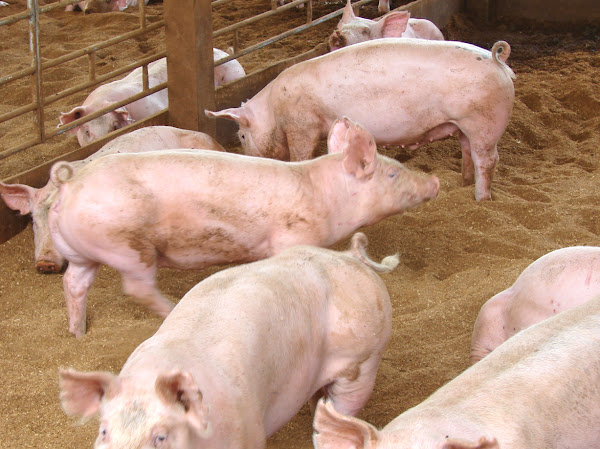
Here we are trying to describe more information about starting and operating a successful pig farming business from selecting breeds, to caring and marketing.
Farm Land Selection
First of all, you have to select a very good location for starting this business. It will be better, if the land is far from residential area.
Selecting a calm and noise and pollution free place will be good for better production of pigs.
Ensure availability of sufficient amount of clean and fresh water in the area. Good transportation system is a must.
Good transportation service will help you to market your products easily, and it will also be much easier to buy the necessary things from market.
Make An Effective Business Plan
Making an effecting business plan is very important for successful pig farming business. A viable business plan helps to run the farm smoothly and also ensures maximum profits from your production business. You can ask for help from an expert for making an excellent pig farming business plan.
Select Right Breed
Selecting the right breed is very important for successful pig farming business. So, choose the breed wisely.
You should choose those breeds which are easily available in your area. Local breeds are also a good option, but production will be less.
Try to consult with some existing producers in your area, and ask for help for selecting the right breed for your business.
Some common and popular pig breeds for commercial production are Yorkshire, Landrace, Duroc, Hampshire, Spotted, Poland China, Chester White and Berkshire.
Housing
Making a good house with the availability of all required facilities is very important for successful pig farming business. A good house not only keeps the pigs healthy, but also helps them to stay free from adverse weather conditions.
Install a good ventilation system, and ensure flow of sufficient amount of fresh air and light inside the house.
Make proper facility for keeping the boar, farrowing, weaner and dry sow separated from each other. Required space for each type of pigs is listed in the following chart.

Feeding
Feeding the pigs with good quality and nutritious food is the most important part of commercial pig production. Good food not only help to keep the pigs healthy, but also help them to grow better and gain weight faster.
You can feed your pigs with almost everything. You can either feed them ready made commercial feeds or you can prepare the feeds of your own.
You can select the most economical ingredients for preparing the feeds. Basic ingredients of pig feed are oat, grains, maize, wheat, rice, sorghum and other millets. You can add some protein supplements like oil cakes, fishmeal and meat meal.

Add all types of mineral supplements and vitamins. Add antibiotic supplements at the rate of 11 mg per kg. It would be better if you can allow your pigs to browse in the pasture and feed fresh green legumes.
The best way to feed the pigs of a farm, is to keep them and feed them separately. That means, keep the different aged pigs separately and feed them according to their age and weight.
Along with feeding nutritious food, always serve them sufficient amount of clean and fresh water. Providing adequate water is very important for good growth of the pigs.
Food demand varies according to the age and body weight of pigs. See the chart below to learn about the required daily feeds according to the body weight of different aged pigs.
| Feeding Amount According to the Body Weight of Pigs | |
| Body Weight of Pigs | Daily Required Food (kg) Per Pig |
| 25 | 2.0 |
| 50 | 3.2 |
| 100 | 5.3 |
| 150 | 6.8 |
| 200 | 7.5 |
| 250 | 8.3 |
Breeding
Pigs are naturally very good breeders. They will breed easily if you keep good ratio of sows and boars.
Pigs generally reach breeding age faster. Both boars and sows become suitable for breeding within their 8 months of age.
Heat period of a sow lasts for 2 to 3 days. But the first day during the heat period of a gilt is the best time to breed, and the second day is the best day for a sow.
A lactating sow become ready for breeding again 2-10 days after weaning. Gestation period of pigs is not more than 115 days. Generally, a sow can give birth of piglets twice a year, and about 8-12 piglets each time.
Caring
Taking good care of the animals is very important for getting good production from your business. Although, pigs are very hardy and require less caring and other management.
Ensure hygiene system inside the house. This will help the animals to stay free from all types of health hazard and diseases.
Keeping the boars and sows separated from each other is a great idea. All the boars are not necessary for breeding. So, keep some for breeding and you can castrate the remaining pigs when they reach 3 to 4 weeks of age.
Avoiding providing of contaminated feeds and polluted water will be good for the health of the pigs. Take extra care of the pregnant and lactating sows.
Vaccinate them on a regular basis to keep them safe from swine diseases. Always try to keep good contact with a vet in your area. Keeping the pigs in a calm and quiet place will be good. And don’t allow visitors inside your farm.
Marketing
Marketing pigs or pig products is very easy. Because both pigs and pig products already have a very good market demand and value. So, you will probably be able to easily sell your products. Although, it is always recommended to determine your marketing strategies before staring any agribusiness.
Best Tips for Successful Pig Farming Business
Commercial pig farming is a profitable business, but it requires careful planning, management, and knowledge of the industry. Incorporating effective strategies can significantly boost your chances of success, whether you are a new or an experienced farmer. Here are some best tips for running a profitable pig farming business.
1. Complete a Training
First of all, you have to complete a training on commercial pig farming business. You can contact with your local agriculture extension office or any experienced pig farmer in your area for training.
2. Conduct Market Research
Before starting a pig farming business, conduct thorough market research to understand the demand for pork products in your target market. Analyze trends, consumer preferences, and competition to make informed decisions. Ask for help from an expert if needed.
3. Develop a Business Plan
Create a comprehensive business plan that outlines your goals, target market, marketing strategies, financial projections, and operational plans. This will serve as a roadmap for your pig farming business.
Try to include everything in the pig farming business plan, and work according to the plan. Ask for help from an expert if you are a beginner.
4. Choose the Right Location
Select a suitable location for your pig farm, considering factors such as accessibility, proximity to markets, availability of utilities, and land cost. Ensure the area has proper drainage and ventilation systems.
5. Select Suitable Pig Breeds
Choose pig breeds that are well-suited to your climatic conditions, market demand, and production goals. Consult with experts or experienced farmers to determine the best breeds for your specific needs.
6. Ensure Proper Housing
Construct well-designed and spacious pig pens that provide adequate space for each pig. Maintain cleanliness, proper ventilation, and temperature control to ensure the health and well-being of the animals.
Remember, a good and hygiene house plays a vital role in maintaining good health of the pigs. And a healthy pig generally grow faster and produce more.
7. Implement Biosecurity Measures
Adopt strict biosecurity measures to prevent the spread of diseases and minimize health risks. Control access to your farm, regularly sanitize equipment, and follow vaccination schedules recommended by veterinarians.
8. Source Quality Piglets
Obtain healthy piglets from reputable breeders or trustworthy sources. Conduct thorough health checks to ensure they are free from diseases or genetic abnormalities. Consult with an existing farmer in your area for having better suggestion.
9. Provide Nutritious Food
Providing the pigs with good quality and nutritious food is very important. Develop a balanced diet plan in consultation with a livestock nutritionist. Provide a nutritious feed that meets the specific nutritional requirements of pigs at different growth stages.
10. Ensure Access to Clean Water
Clean and fresh water is very essential for the pigs. So, ensure a constant and clean water supply for your pigs. Install adequate waterers and regularly monitor water quality to maintain hydration and prevent diseases.
11. Follow Good Breeding Practices
Implement proper breeding techniques and maintain accurate records of breeding cycles, mating dates, and individual pig performances. This will help you track productivity and manage genetics effectively.
12. Implement Waste Management Systems
Develop effective waste management systems to handle pig manure and other farm waste. Consider environmentally friendly options like biogas production or composting. Doing this also helps to maintain hygiene.
13. Regular Health Monitoring
Regularly monitor the health of your pigs and be vigilant for signs of illness or distress. Establish a working relationship with a veterinarian who can provide timely medical care and advice. You can also stock some common and necessary medicines for emergencies.
14. Practice Proper Handling and Transport
Handle pigs with care and employ humane handling practices. When transporting pigs, ensure proper ventilation, sufficient space, and minimal stress to prevent injuries or fatalities.
15. Implement Record-Keeping Systems
Maintain detailed records of financial transactions, breeding data, veterinary treatments, and production performance. Analyzing these records will enable you to make informed decisions and improve farm efficiency.
16. Invest in Training and Education
Stay updated with the latest advancements in pig farming techniques, disease management, and industry practices. Attend workshops, seminars, and conferences to enhance your knowledge and skills.
17. Build Relationships with Suppliers
Establish strong relationships with suppliers of pig feed, medications, equipment, and other essentials. Reliable suppliers can ensure a steady supply of quality inputs for your farm.
18. Adopt Technology
Embrace technological advancements to streamline farm operations, improve efficiency, and enhance productivity. Consider implementing automated feeding systems, climate control systems, and data management software.
19. Market Your Products
Develop a marketing strategy to promote your pork products. Establish partnerships with local restaurants, grocery stores, and distributors. Leverage social media platforms and create a professional website to reach a wider customer base.
20. Consider Value-Added Products
Explore the possibility of producing value-added pork products such as sausages, bacon, or cured meats. This can increase profit margins and cater to diverse consumer preferences.
21. Monitor Industry Trends
Stay updated with industry trends, consumer demands, and regulatory changes. Adapt your farming practices and business strategies accordingly to stay competitive in the market.
22. Network with Other Farmers
Join local farming associations or online communities to connect with fellow pig farmers. Sharing experiences, knowledge, and best practices can be immensely valuable for your business.
23. Secure Adequate Insurance Coverage
Protect your pig farming business from unforeseen events by obtaining appropriate insurance coverage. Consult with insurance professionals to determine the most suitable policies for your farm.
24. Maintain Financial Discipline
Maintain accurate financial records and regularly review your farm’s financial performance. Monitor expenses, track revenue, and make sound financial decisions to ensure the long-term sustainability of your business.
25. Diversify Your Income Streams
Consider diversifying your income streams by exploring additional revenue-generating activities. This could include selling manure as organic fertilizer or offering farm tours to educate the public about pig farming.
26. Prioritize Animal Welfare
Ensure that your pigs are treated with care and provided with a comfortable and stress-free environment. Adhere to animal welfare guidelines and follow ethical farming practices.
27. Seek Expert Advice
Do not hesitate to seek advice from experts, consultants, or experienced pig farmers. Their insights and guidance can help you overcome challenges and make informed decisions.
28. Prepare for Seasonal Variations
Be prepared for seasonal variations in pig farming, such as changes in feed availability, temperature fluctuations, or market demand. Plan ahead and adjust your strategies accordingly.
29. Stay Compliant with Regulations
Understand and comply with local regulations, permits, and licensing requirements for operating a commercial pig farming business. This ensures legal compliance and prevents potential penalties or disruptions.
30. Monitor and Control Diseases
Regularly monitor your pigs for signs of diseases and promptly isolate and treat any affected animals. Implement strict biosecurity protocols to minimize disease outbreaks. You can also stock some common and necessary medicines for emergencies.
31. Evaluate Performance Metrics
Regularly assess key performance indicators (KPIs) such as feed conversion ratio, average daily gain, mortality rate, and market prices. This evaluation will help you identify areas for improvement and maximize profitability.
32. Continuously Improve
Continuously strive for improvement in all aspects of your pig farming business. Embrace new technologies, adapt to market changes, and implement innovative practices to stay ahead of the competition.
33. Stay Passionate and Committed
Running a successful pig farming business requires dedication, hard work, and passion. Stay committed to your goals, be resilient in the face of challenges, and enjoy the rewards of a thriving enterprise.
Frequently Asked Questions (FAQ)
There are many questions related to pig farming business. Especially beginner pig farmers ask many questions. Here we are trying to answer some of the questions that pig farmers ask. Hope you will find yours, but if not, don’t hesitate to ask.
Is pig farming profitable?
Yes, definitely! Diseases and other major health problems are less in pigs. And the pigs generally grow faster. So, pig farming is highly profitable.
Small scale or commercial farming which is more profitable?
Of course, commercial pig production is much profitable. But it requires huge investment. If you have capital issue, you should start with small scale production.
What is pig farming called?
Pig farming is called piggery (where pigs are raised).
How long do pigs take to grow?
It actually depends on the breed you are raising. Most of the commercial pig breeds take around 6 months for reaching market weight.
How many pigs should I start with?
It actually depends on many factors, especially your budget. You can start as less as 2 pigs or as many as hundreds or even thousands of pigs. The more number of pigs you raise the more man power and money you need.
Is pig farming a good investment?
Yes, pig farming is a profitable business. So it is a good investment.
Which is the best pig breed for commercial production?
Some common and popular pig breeds for commercial production are Yorkshire, Landrace, Duroc, Hampshire, Spotted, Poland China, Chester White and Berkshire.
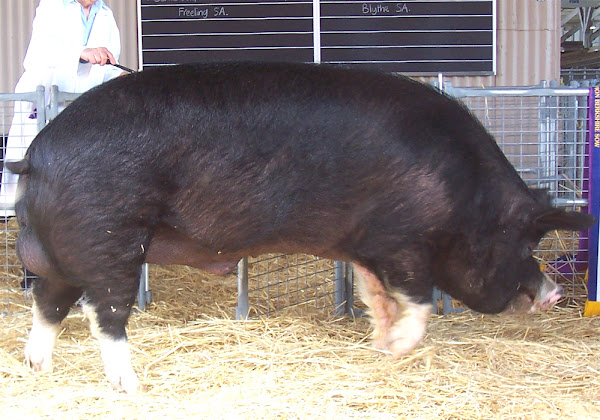
Which pig breed grows fastest?
A crossbred pig grows faster than any other breeds.
What are the advantages of pig farming?
There are numerous advantages of pig farming business. We have already listed the top advantages of this business above.
What are the disadvantages of pig farming business?
High capital requirement, high feeding costs, cannibalism, foul smell are the main disadvantages of commercial pig production business.
How do you feed pigs cheaply?
Allowing your pigs to access pasture is a great way to feed them cheaply.
How many times can a pig get pregnant in a year?
Mamma pigs can usually breed twice a year and produce two healthy litters. Their pregnancy period is short (only about 3 months and 3 weeks), which helps them breed more often.
What food makes pigs grow faster?
Feeding a grain mix of barley, wheat, sorghum and corn will help your pigs grow faster.
What food is good for pigs?
Commercially prepared pig feed is very good for faster growth of your pigs. Actually, pigs can eat all kinds of scraps or leftover food such as mealie-pap, bread, vegetables, fruit and pig pellets.
How much money do you make per pig?
It actually depends on numerous factors. So, it’s very tough to tell the exact amount. But on an average, you can expect between $200 and $500 per pigs if you sell directly to customer.
How Many Pigs Do You Need To Make A Profit?
There is no limit. It can be simply one pig for making small amount of profit. The more pigs you raise, the more the profits will be. It’s simple!
How many pigs per acre?
If you allow your pigs to access pasture, then having around 25 pigs per acre will be good.
What are the common diseases of pigs?
Main diseases of pigs are coccidiosis, exudative dermatitis, respiratory diseases, swine dysentery, mastitis and porcine parvovirus. Consult with a vet in your area for having better recommendation about controlling all these pig diseases.
How long is a pigs labor?
Duration of a pig’s labor ranges from 30 minutes to around or more than 5 hours.
What is a baby pig called?
A baby pig is called as piglet or farrow.
What is a male pig called?
A male pig is called boar.
What is a female pig called?
A female pig is called as a sow.
How long do piglets stay with their mother?
Piglets are frequently removed from their mothers when they are less than 4 weeks of age in commercial pig production systems.
How much feed does a pig eat per day?
It actually depends on the breed. On average a pig will consume between 5 and 7 lbs of food par day.
How much water do pigs need per day?
Daily water needs for pigs range from half gallon to 1.5 gallon per day. Water requirements for breeding swine range from 4 gal/day for gestating females and 6 gal/ day for lactating swine.
Is rice good for pigs?
Yes, pigs love to eat all types of rice, and this can be a great addition to your pigs diet which should consist of high nutritional content.
How much land do you need for a pig?
It is recommended that you plan for around 8 square feet of space per pig for growing pigs.
Any tips for pig farming for beginners?
Always try to feed your pigs with good quality and nutritious food, monitor their health on a regular basis and always try to take good care of them.
Do you have a pig farming project report?
Yes, we have a demo only. Please consult with an expert in your area and ask for help for creating a good project report for you.
Any suggestions on pig farming business plan?
Try to include as many factors as you can in your business plan from starting to marketing.
Any pig farming training centers available?
Yes, pig farming training centers available in many countries around the world. Please consult with your local agriculture extension office for having better recommendations. They will be able to give you better information regarding training.
How to reduce pig feeding costs?
You can reduce pig feeding costs by allowing your pigs to access pasture.
Any suggestion for pig farming housing plan?
Try to keep separate space for pregnant sow, boar and piglets in your housing plan.
What are the pig farming requirements?
Good shelter, very good ventilation, no overheating, no smells, no draft and no dampness are the top requirements for commercial pig rearing business.
What is the difference between swine and pig?
In Britain the term pig refers to all domestic swine, while in the United States it refers to younger swine not yet ready for market and weighing usually less than 82 kg, others being called hogs.
These are the common ways and steps for starting a profitable pig farming business. Raising pigs is really easy and simple. Hope this guide has helped you! Good luck & may God bless you!
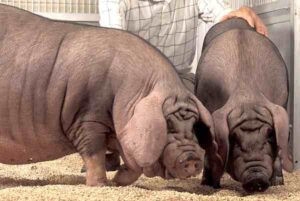
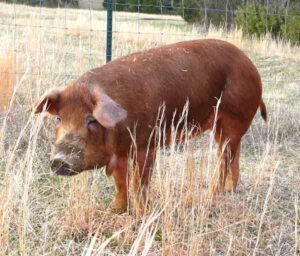
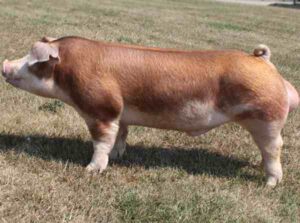
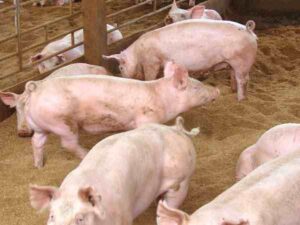
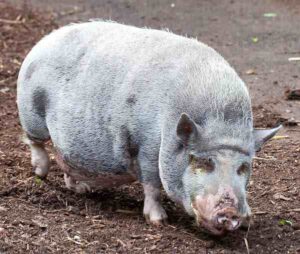

VERY USEFULL
THANK YOU
I’m willing to start farming of pigs as for now l plan to find capital and place
Which areas in Ghana would you recommend for pig farming, especially around Greater Accra?
You can do pig farming all around the world, where you can grow or buy the food that is neccecary. A lake in the near of you pig farm is a good idear, because the most pigs like to swim and bath in the whater.
Good day Jesper
I kindly did read and I’m interested in farming .and want to do that farming
Kindly regards
Potso Sehularo
I have learned a lot, but I need to know how to boost piglets
Thanks for your advice
I wish to try the business
Best of luck!
Very helpful article… Thank you so much for the guidance and God bless you too
Thank you for these information, looking forward to give it a try.
Thanks for the information, am going to put it into practice
I appreciate your efforts… you most have gone through so many research to bring this out… keep the good job.
The writeup is worthy of trial; that is when one will be convinced.
Thank you for the detail information, what a great teacher
I would like to go into Pig farming, but production of pig feeds is my challenge. Can you help pls.
It was really useful,this is just what i was looking for.Thanks a million.
Very helpful information more so for someone thinking of starting pig farming. Very concise and to the point.
i learn lot .how can i boost my pig to be grow up fast
Feed them with very good quality and nutritious food. Thank you!